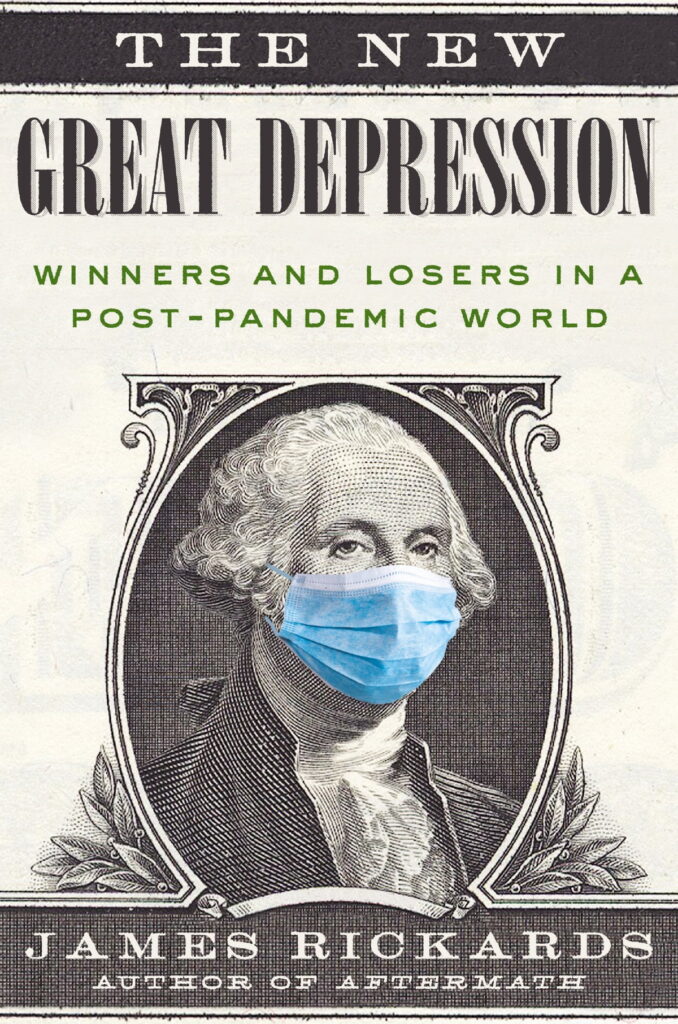Read Will Rogers column 88 years ago: June 16, 1935

“The man who predicted the worst economic crisis in US history shows you how to survive it.
The current crisis is not like 2008 or even 1929. The New Depression that has emerged from the COVID pandemic is the worst economic crisis in U.S. history. Most fired employees will remain redundant. Bankruptcies will be common, and banks will buckle under the weight of bad debts.
But for knowledgeable investors, all hope is not lost.
In The New Great Depression, James Rickards, New York Times bestselling author of Aftermath and The New Case for Gold, pulls back the curtain to reveal the true risks to our financial system and what savvy investors can do to survive — even prosper — during a time of unrivaled turbulence. Drawing on historical case studies, monetary theory, and behind-the-scenes access to the halls of power, Rickards shines a clarifying light on the events taking place, so investors understand what’s really happening and what they can do about it.
A must-read for any fans of Rickards and for investors everywhere who want to understand how to preserve their wealth during the worst economic crisis in US history.”
I did find a quote in it however.
The result is another twenty years of slow growth, austerity, financial repression (where interest rates are held below the rate of inflation to gradually extinguish the real value of debt), and an expanding wealth gap. The next two decades of U.S. growth would look like the last three decades in Japan. Not a collapse, just a long, slow stagnation—another name for depression.
Above 90 percent debt-to-GDP, an economy goes through the looking glass into a new world of negative marginal returns on debt, slow growth, and eventual default through nonpayment, inflation, or renegotiation.
This point of default is sure to arrive, yet it will be preceded by a long period of weak growth, stagnant wages, rising income inequality, and social discord—a phase where dissatisfaction is widespread, yet no denouement occurs. Other respected research reaches the same conclusion. Reinhart and Rogoff may have led the way in this field, but they are not out on a limb. Evidence is accumulating that developed economies, in particular the United States, are on dangerous ground and possibly past a point of no return. — Book promo @ goodreads.com

The past few days I have been all engaged in trying to take the next step with the Bulgaria, now the Peace Corps, project. That is to take all those pages and convert them into a PDF file which anyone can read online or download and read offline. Another time waster in some ways but a great learning experience as well. I have had limited success so far.
Yesterday I spent a lot of time going back and redoing the pages to improve their appearance when converted. That part of the project will continue today and probably for one or two more days. There is that plus some other clean up work that had to be done. e.g. Getting all the pictures organized being one of those clean up tasks.
This morning I went back and replaced what I had done yesterday afternoon. I had tried to use the WordPress Next Block to link pages but it was not working as it is described in the WordPress documentation. There it claimed I could enter an Order Number and the Next Block would link page one to page two, two to three etc. Didn’t work. So I spent a lot of time creating links the old fashioned way.
Then last night I had a epiphany. I realized that what the Next Block was doing was linking by the published date and time. So this morning I was able to edit the time on those pages that were not linking correctly and then the Next Block worked great. I think Astra has changed the way that Block works so they can reinstall the Order Number feature as part of their Pro package that you must buy. That would be good marketing but ‘dirty business’ if that is what has been done.

I do not have any quotes but suggest that you read Russia’s New Roadmap for Multipolar World by Pepe Escobar